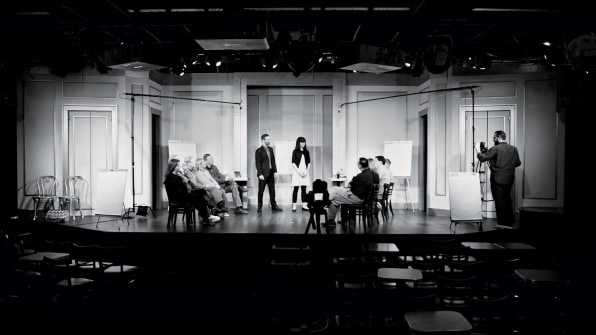An Important Technique to Improve Communication Effectiveness Is to
Have you heard the one about the man who took off his pants in the middle of a corporate training exercise? "That happened once!" says actor Robyn Scott. She's describing the freewheeling atmosphere integral to the communications workshops she runs for Second City, the improv theater that famously served as a launchpad for some of the biggest names in entertainment, including Tina Fey, Amy Poehler, and Steve Carell. As an instructor with Second City Works (SCW), the theater's consulting side, Scott leads groups of up to 50 employees from such companies as Cisco, Facebook, and Google in a series of 10- to 20-minute exercises that draw on one of the key tenets of improv: the willingness to adopt a "Yes, and . . . " approach to conversation. "It's perfect for brainstorming and also helps people open up in situations that might trigger anxiety, like a process or management change," says Scott. She and fellow actor Meagan O'Brien share how they use improv schooling to inspire creative solutions.

Know Your Audience
Scott says Google has hired SCW to bridge generation gaps between employees. "You have teams with a lot of enthusiastic, imaginative people right out of college working with people who have been at the company for years, and they have to be able to communicate," she says. She initiated an exercise known around SCW as "the 600-year-old expert." Participants are divided into groups of three and given 60 seconds each to explain what a smartphone does without using any props. The first person describes it for someone in the year 2016, the second as if the audience was from the 1950s, and the third has to describe it to people from the 1600s. "You have to think, What do they need? Do they need a map? Do they need to know the weather?" says Scott. "It forces you to be empathetic to their point of view."
Play The Scene You're In
After the passage of the Affordable Care Act, Blue Cross Blue Shield asked SCW to help its staff deal with massive upheaval in the insurance industry. O'Brien paired employees and asked them to make a change to their appearance. At first, people found the request simple—they removed their glasses or took off a shoe. But as they were asked to make more adjustments, they got angry, thinking that their only option was to keep stripping. And then, the breakthrough: They realized they could add to their appearance by borrowing discarded items from partners. That's when the fun started. "Whenever we run this exercise, we remind people that when you're asked to take on a new process, you have more control and more resources at your disposal than you think," says O'Brien.

Find The Hero In Any Narrative
Another request from Google was to help people learn to convey data-heavy information to nontechnical colleagues and company outsiders in a compelling way. Scott helped them learn to identify the "hero." "The hero isn't necessarily the good guy," says Scott. "It's the person or product or process that is transformed." In one exercise, pairs of people took turns summarizing a story they both knew well (a fairy tale, a movie) in 60 seconds, 30 seconds, 10 seconds, and then as a hashtag. "In the debrief, people admitted that after doing all that work, they would [go back and] tell the 60-second version differently," says O'Brien. "Now they understood the key points better."
Let Go Of Your Own Agenda
Before Dow Chemical started a clean-water project in Ghana, the company convened its rising global leaders for a week of training. The goal: to help people from different countries and cultural backgrounds communicate effectively. "They all spoke English, but they wanted to have a common language in terms of strategy," says Scott. She facilitated 90-second conversations with only one rule: The last word in one person's statement had to become the first word in her partner's statement. "You have to drop your own talking points and the need to assert your intelligence," says Scott. "Especially when social and cultural idioms and different languages are involved, being able to really listen and assume the best in someone is crucial."
An Important Technique to Improve Communication Effectiveness Is to
Source: https://www.fastcompany.com/3065230/four-improv-techniques-that-can-help-you-communicate-better
0 Response to "An Important Technique to Improve Communication Effectiveness Is to"
Post a Comment